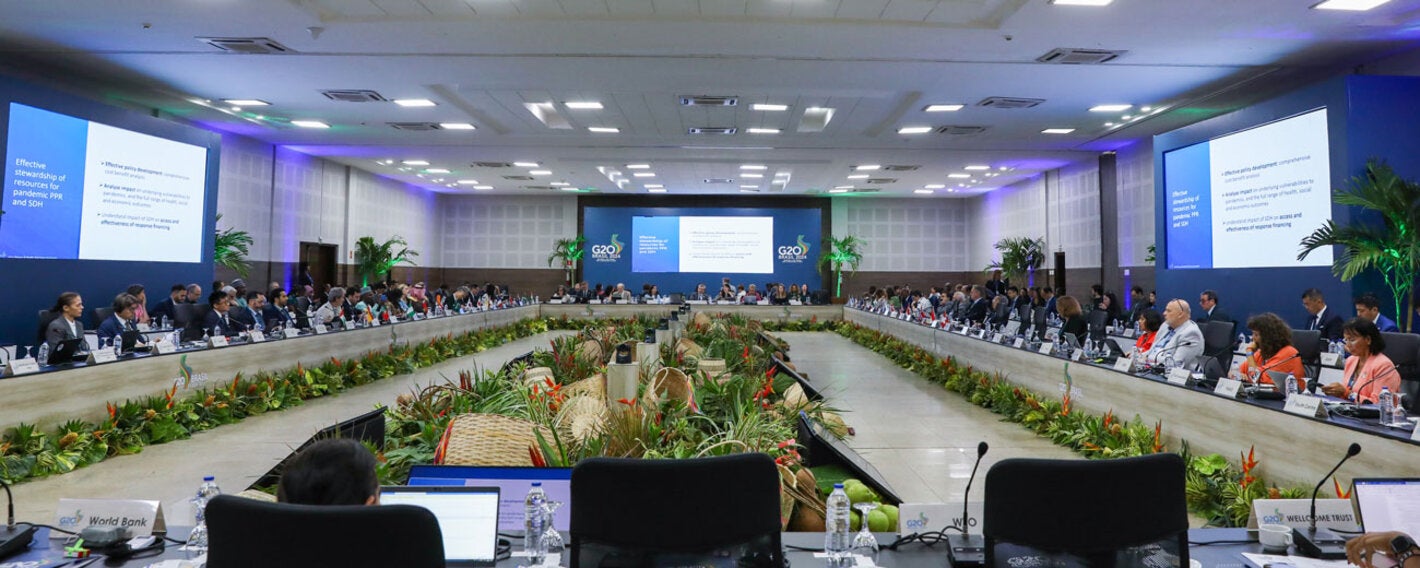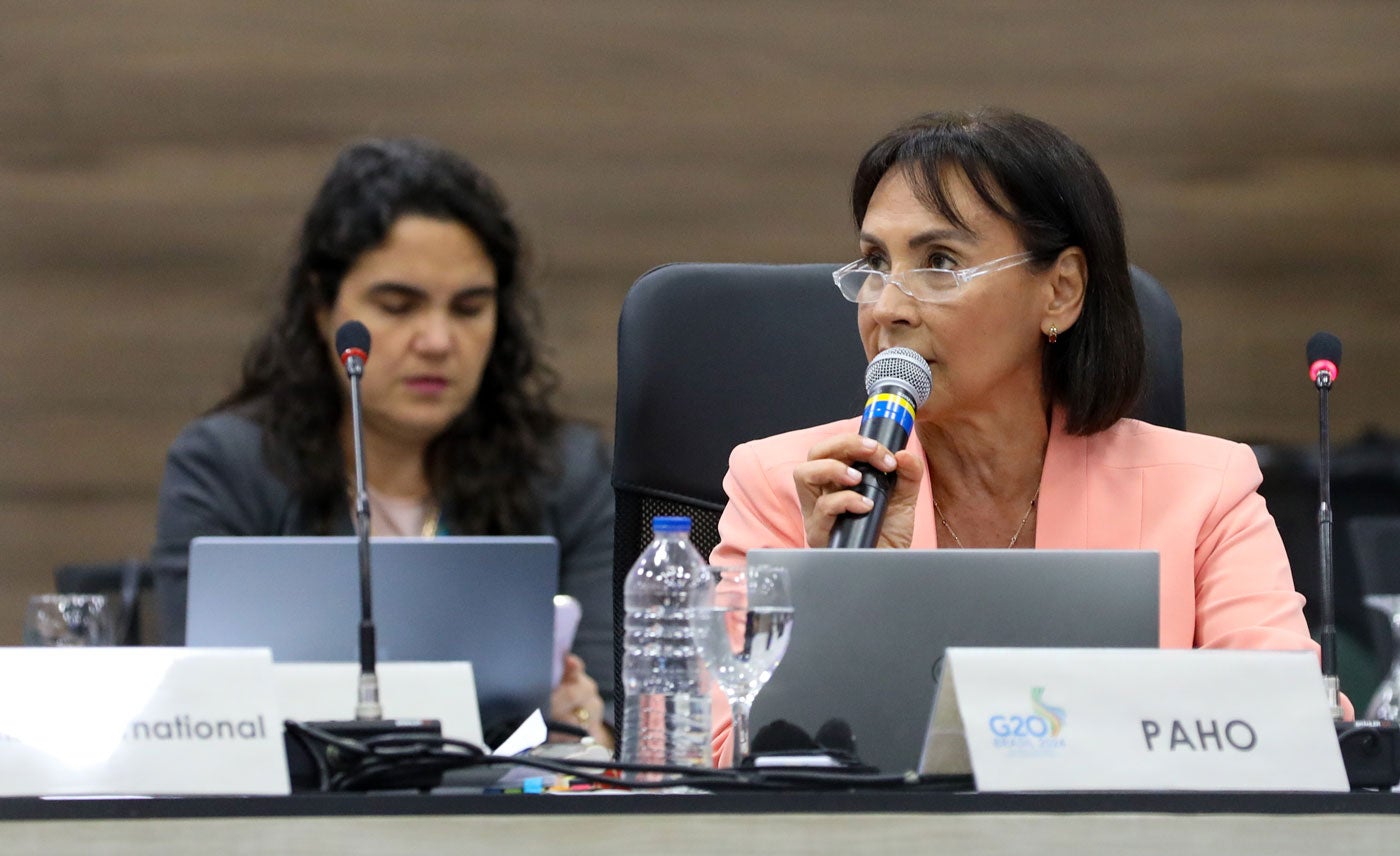
Salvador, Brazil, 6 June 2024 (PAHO/WHO) – Experts from the Pan American Health Organization (PAHO) participated in the 3rd G20 Health Working Group to discuss the importance of promoting health equity and advancing the 2030 agenda.
Discussions at the meeting, which took place from 2 to 6 June in Salvador, Bahia, Brazil, underscored the need for a multisectoral approach to address the social determinants of health, integrating education, housing, and employment into public health policies.
During the event, delegates participated in plenary discussions, as well as six thematic side-events on a variety of health issues key to advancing the sustainable development agenda. These include primary health care, digital health, antimicrobial resistance, artificial intelligence in health, and climate change, among others.
Climate change and equity
The Region of the Americas is one of the most vulnerable to extreme weather events, with economies dependent on climate-sensitive factors, such as agriculture and tourism.
The Americas also faces high levels of social inequality, impacting even more vulnerable communities and increasing the challenges faced due to climate change.
During the plenary sessions, PAHO called for collective, coordinated action to prepare, prevent and address the impact of climate change events on the health sector. The Organization also underscored the need for a climate change approach to health, with an equity focus, as well as for the involvement of the most impacted communities in this debate.
Artificial Intelligence
The event, Artificial Intelligence for supporting public health, organized with the World Health Organization (WHO), PAHO, the Wellcome Trust, the World Economic Forum, the Inter-American Development Bank, and UNICEF, highlighted the main issues around the application of artificial intelligence (AI) in health care.
Participants discussed the potential of new technology to enhance health equity and access in underserved and low-resource areas, as well as the ethical use of AI and issues of cybersecurity.
During the event, the Secretary of Information and Digital Health of the Ministry of Health of Brazil, Ana Estela Haddad, highlighted PAHO’s work in this area, particularly when it comes to designing, planning and implementing national policies on digital health and AI.
Antimicrobial resistance
Antimicrobial resistance was a key agenda item during the events Enhancing global cooperation for strengthening the implementation of national action plans to tackle antimicrobial resistance (AMR), co-hosted by PAHO, WHO and Brazil, and Access to new medicines: a push towards optimizing the AMR response, in partnership with the Global Antibiotic Research and Development Partnership (GARDP).
During the events, PAHO highlighted the importance of national action plans to tackle AMR based on a transversal and multisectoral approach, rather than a disease-specific one. Action plans should be people-centered and implemented through a cost-effective package of interventions to decrease the burden of AMR, and highlight the public health benefits of addressing this issue.
Primary health Care
Organized by PAHO in cooperation with the Inter-American Development Bank, and the World Bank, the event Sustainable financing for primary health care: Building the foundation of resilient health systems, underscored the importance of resilient health systems anchored in primary health care.
During the event, Brazil, Chile and Colombia presented their experiences of strengthening their national health systems through strategic investments in infrastructure, digital technology, and a multidisciplinary healthcare workforce.
The organizers also presented their collaborative work on the Alliance for Primary Health Care, which supports the acceleration of PHC in all countries of the Region of America through investment, innovation and implementation in the matter.
Technology and regional capacity
Two technical events, Fostering equity and sustainability: leveraging partnerships and pooled procurement for access to health technologies and to build regional manufacturing capacity, and Building on experience: establishing a sustainable value chain for fit-to-purpose health product innovation and regional production through partnerships, highlighted the need for equitable access to innovation for health.
During the events, participants discussed the importance of an alliance led by G20 governments to create and implement models for innovation, manufacturing and technology transfer, and called for the equitable access to resulting products across the region.
PAHO advocated for increased local production, and urged countries, and the region as a whole, to address gaps in research and development.
As the G20 maintains its pivotal role in fostering international cooperation, the meeting underscored the commitment of global stakeholders towards advancing public health agendas across borders, as well as towards empowering communities worldwide.
About the G20
The Group of Twenty (G20) is an international economic cooperation forum made up of 19 countries (South Africa, Germany, Saudi Arabia, Argentina, Australia, Brazil, Canada, China, South Korea, the United States, France, India, Indonesia, Italy, Japan, Mexico, the United Kingdom, Russia and Turkey) and two regional bodies: the African Union and the European Union. The Presidency of the G20 is currently held by Brazil.




